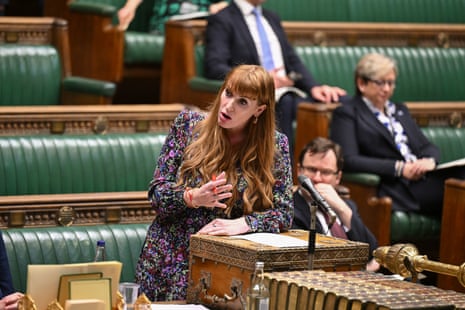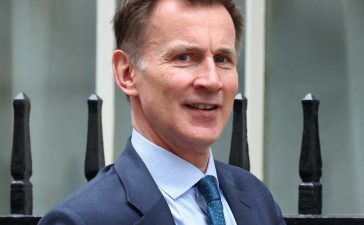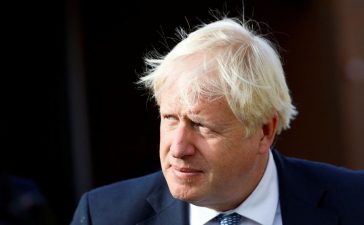Angela Rayner says she wants to see Diane Abbott get Labour whip restored
Keir Starmer ducked a question about whether he wanted Diane Abbott to have the Labour whip restored to her when he was on Radio 2 at lunchtime.
Abbott has been suspended for almost a year because of a letter she wrote to the Observer downplaying the seriousness of antisemitism and implying it was not as serious as the racism experienced by black people. Jeremy Vine put it to Starmer that, in the light of what was said about her by Frank Hester, Starmer should restore the whip and ‘“put a welcoming arm around her”.
Starmer said Abbott had received more racist and misogynistic abuse than any other MP and “so we absolutely need to put our arm around her and give her support in relation to that”. At another point, he described her as “a trailblazer”.
But, on the subject of having the whip restored, Starmer claimed that was not a matter for him. He said:
That was about allegations of antisemitism in relation to a letter … which is subject to an ongoing investigation which is separate from me. That’s not something which I conduct. That’s an independent process.
When Vine said Abbott had apologised for the letter, Starmer replied:
Well, yes, but it’s not resolved.
But Angela Rayner, the deputy Labour leader, was prepared to say that she wanted Abbott back in the party at a lunch with journalists today. Speaking to the parliamentary press gallery, she said:
Personally, I would like to see Diane back but the Labour party has to follow its procedures.
And for me, that is the most important thing – that we have made sure our party is fit to govern by making sure we have got complaint procedures that are robust and people can have confidence in.
So it doesn’t matter what I think because I don’t make that decision because it is done through a panel, it has gone through experts, and I’m not involved in that process.

Key events
Afternoon summary
-
Angela Rayner, Labour’s deputy leader, has said she would like to see the party whip restored to Diane Abbott. (See 4.07pm.)
-
NHS waiting lists in England have fallen for the fourth consecutive month, according to new figures, although the number of people waiting longer than 18 months for treatment has increased. As PA Media reports, cancer waiting times also remain well below target, the data shows, with charities calling for a long-term cancer strategy. An estimated 7.58 million treatments relating to 6.32 million patients were waiting to be carried out at the end of January, down slightly from 7.60 million treatments at the end of December.
What Tom Baldwin’s biography says about Starmer and Labour’s disciplinary machine
Comparing what Keir Starmer said about Diane Abbott’s suspension with what Angela Rayner said about it (see 4.07pm), it is tempting to conclude that, while Rayner wants her back in the party, Starmer definitely doesn’t.
Starmer’s interview with LBC could be seen in this light too. Asked about Abbott’s suspension, Starmer said this “needs to be resolved, of course it does”. But when Lewis Goodall, the interviewer, put it to him that it should not take 11 months to investigate a single letter, Starmer replied:
But it was a pretty offensive letter … this wasn’t just a casual remark.
However, Rayner and Starmer are in a different situation. As deputy leader, Rayner can say, as she did, she would like to see Abbott back, but it’s not a decision for her. In the Labour party, the deputy leader little or no power over the party machine. But the party leader can’t say he would “like to see” such and such an outcome without implying that he is putting pressure on those taking the decision. In its report in 2020 the Equality and Human Rights commission said “political inteference” in antisemitism complaints from the leader’s office meant the party was in breach of the Equality Act.
Under Starmer, Labour has been accused of developing a control freak culture that goes way beyond what happened during previous bouts of faction fighting in the party. This is apparent in candidate selection and in the way disciplinary rules are enforced. But it is not entirely clear to what extent Starmer himself is pushing this, and in his new biography of the Labour leader, Tom Baldwin claims that Starmer was worried when he heard about one of the most egregious examples of someone being purged – the Compass director Neal Lawson (who wrote about his experience for the Guardian).
Baldwin says:
It’s also fair to point out that Starmer is prevented from getting involved in any disciplinary process which, under his reforms, is meant to be independent of interference from the leadership. Indeed, he is understood to have been surprised and a little perturbed when it emerged that Neal Lawson, a longstanding campaigner from the soft left for a ‘progressive alliance’ with the Liberal Democrats and the Greens, was under investigation for a social media post that showed him praising co-operation between parties as ‘grown-up politics’. Lawson, meanwhile, vented that Labour had been ‘captured by a clique who see only true believers or sworn enemies’ which was behaving like ‘playground bullies’.
Baldwin also says that Starmer is not involved in the murkier decisions about candidate selection.
Although Starmer had tightened central control over selections by pushing through reforms at the National Executive Committee, he keeps away from the business end of it, with one official saying: ‘Keir doesn’t need to know how sausages are made.’
Journalists often write mid-flight biographies of politicians on the basis that one day they might become prime minister, generally they are worth a read, but few of them are likely to stand the test of time. Baldwin’s book is an exception; as well as being very well written, he obtained considerable access and he presents a compelling picture of what Starmer is like, and in particular how he was brought up. If you admire Starmer, you should definitely read it. And if you don’t like him, you should read it anyway, because he could be PM for the next 10 years and it may be a very long time before anyone produces a better or fairer account of what makes him tick.
Starmer says Sunak ‘failing test’ on donations after report says Tories have had further £5m from Hester
Keir Starmer has renewed his call for the Tories to return donations from Frank Hester, saying that reports that he has given the party a further £5m “makes the situation worse”.
Earlier this week the Tories said they would not be returning the £10m they had already received from Hester, arguing that he had apologised. But a minister did not rule out further donations being accepted.
After Tortoise reported today that Hester has donated a further £5m, which has not yet been publicised by the Electoral Commission because it is recent, Starmer was asked on LBC what the Tories should do with the money. He replied:
Well, if that’s true, it makes the situation worse, because it begins to give an explanation as to why Rishi Sunak will not hand this money back …
This is a significant contribution to their electoral campaign. And he won’t hand it back.
Now this is the same prime minister who took it on himself to do a broadcast, essentially walking into our living rooms two weeks ago Friday, at ten to six, to parade as a unifier and a man that could bring people together.
Amongst the comments [from Hester about Diane Abbott], not just racist and misogynistic about Diane Abbott, this is a donor who said she should be shot.
There’s only one answer to returning that money. It’s a test for Rishi Sunak. He’s failing that test.
Angela Rayner says she wants to see Diane Abbott get Labour whip restored
Keir Starmer ducked a question about whether he wanted Diane Abbott to have the Labour whip restored to her when he was on Radio 2 at lunchtime.
Abbott has been suspended for almost a year because of a letter she wrote to the Observer downplaying the seriousness of antisemitism and implying it was not as serious as the racism experienced by black people. Jeremy Vine put it to Starmer that, in the light of what was said about her by Frank Hester, Starmer should restore the whip and ‘“put a welcoming arm around her”.
Starmer said Abbott had received more racist and misogynistic abuse than any other MP and “so we absolutely need to put our arm around her and give her support in relation to that”. At another point, he described her as “a trailblazer”.
But, on the subject of having the whip restored, Starmer claimed that was not a matter for him. He said:
That was about allegations of antisemitism in relation to a letter … which is subject to an ongoing investigation which is separate from me. That’s not something which I conduct. That’s an independent process.
When Vine said Abbott had apologised for the letter, Starmer replied:
Well, yes, but it’s not resolved.
But Angela Rayner, the deputy Labour leader, was prepared to say that she wanted Abbott back in the party at a lunch with journalists today. Speaking to the parliamentary press gallery, she said:
Personally, I would like to see Diane back but the Labour party has to follow its procedures.
And for me, that is the most important thing – that we have made sure our party is fit to govern by making sure we have got complaint procedures that are robust and people can have confidence in.
So it doesn’t matter what I think because I don’t make that decision because it is done through a panel, it has gone through experts, and I’m not involved in that process.
Tories urged to return further £5m donation made by Frank Hester
The Conservative party has been urged to decline or return a reported further £5m donation made by Frank Hester, whose remarks about Diane Abbott have been widely condemned as racist and misogynistic, Peter Walker reports.
Organisers of pro-Palestinian marches describe extremism definition as ‘assault on core democratic freedoms’
The Palestine Solidarity Campaign and other groups that have been organising the pro-Palestinian protests since the Israel-Hamas war started have issued a statement saying that Michael Gove’s extremism definition is “in reality an assault on core democratic freedoms, seeking to silence dissenting voices”.
In the statement, they said it is the government itself that is being extremist. They say:
The government has used the protests we have organised in response to Israel’s genocide against the Palestinian people as a core rationale for the need to redefine extremism. Successive government minsters and pro-Israel voices have attempted to demonise those protesting as hatemongers, Islamist mobs and antisemites. The reality is that, as the police themselves have publicly affirmed, the marches have been overwhelmingly peaceful and attended by a broad cross section of British society, young and old, of all faiths and none.
It is the government, while claiming to champion democracy, that is eroding rights we are marching to protect – democratic rights at home and respect for international law globally. It is the government that is pursuing an Islamophobic agenda which seeks to confine the Muslim community to the margins of democratic society.
It is a government which has run roughshod over the rule of law, illegally proroguing parliament, illegally planning to send asylum seekers to Rwanda, and whose MPs have deliberately exacerbated racism and Islamophobia. It should stand charged of falling foul of its own definition of extremism.
The other groups that help organise the marches and that have signed the statement are: Palestinian Forum in Britain, Friends of Al-Aqsa, Stop the War Coalition, Muslim Association of Britain, Campaign for Nuclear Disarmament. Gove named the Muslim Association of Britain today as one of three Muslim-led groups that he claimed might qualify as extremist under the new definition. (See 1.46pm.)
Muslim group Mend rejects Gove’s claim it’s ‘Islamist’, and suggests it will sue if he repeats claim outside parliament

Sammy Gecsoyler
Mend (Muslim Engagement and Development), one of the groups named by Michael Gove as a “rise for concern” under new extremism guidelines, has challenged the communities secretary to repeat his claim that it has called for the establishment of an “Islamic state governed by sharia law” outside of parliament without the protection of parliamentary privilege.
In a statement, Mend, an advocacy group, called the new definition a “blatant attack on civil liberties and free speech” and compared the move to something more “suited to stifling dissent in authoritarian repressive regimes”, saying it was being “used to silence those exposing UK government complicity in the Gaza genocide”.
In the Commons, Gove said:
Islamism is a totalitarian ideology which seeks to divide, calls for the establishment of an Islamic state governed by sharia law and seeks the overthrow of liberal democratic principles.
Organisations such as the Muslim Association of Britain, which is the British affiliate of the Muslim Brotherhood, and other groups such as Cage and Mend give rise to concern for their Islamist orientation and views.
In response, Mend CEO Azhar Qayum said:
We challenge Michael Gove to repeat his claims outside of parliament and without the protection of parliamentary privilege if he believes he can provide the evidence to back up his view that Mend has called for the establishment of an ‘Islamic state governed by sharia law’.
Parliamentary privilege allows MPs to speak in the House of Commons with legal immunity, including protection from defamation claims.
The advocacy group said Gove “has a long track record of Islamophobic views and associations” including leading the government’s role in the Trojan Horse affair, when it was falsely alleged that an extremist takeover of schools in Birmingham was under way; writing a book called Celsius 7/7 in which he highlighted the “threat of Islamism”; and being a founding member of the Henry Jackson Society, which they say “has promoted an anti-Muslim agenda over many years”. It went on:
Given his own ‘extremist’ credentials, for him to be lecturing others as to who is or is not an extremist is an example of rank hypocrisy, and there would appear to be a persuasive argument that he is also an extremist on his own definition.
According to a report by Cat Neilan at Tortoise, Frank Hester has not just given the Conservative party £10m, the figure that has been widely quoted in the reports about his comments about Diane Abbott and the controversy that has generated. Neilan says he has given another £5m, which has not yet been declared in the data published by the Electoral Commission because it is recent. It may appear in an update from the commission in early June, she says. She reports that the Conservative party did not deny getting another £5m from Hester, but just said: “Declarable donations will be published in the usual way by the Electoral Commission.”
MPs to get 5.5% pay rise from April, taking annual salary to £91,346
MPs are set to get a pay rise of 5.5% from April – bringing the overall salary to £91,346, PA Media reports. PA says:
The Independent Parliamentary Standards Authority (Ipsa) said the decision had been taken in line with the award recently agreed for the senior civil service.
The increase is considerably larger than the 2.9% pay uplift last year, when the expenses watchdog said it had “considered very carefully” the “extremely difficult” economic backdrop amid the cost-of-living crisis.
Announcing the 2024 pay decision, Richard Lloyd, chair of Ipsa, said:
Ipsa has been responsible for deciding MPs’ pay since 2011. Since then, our aim has been to make fair decisions on pay, both for MPs and the public.
Serving as an MP should not be reserved to those wealthy enough to fund it themselves. We believe our decision recognises the vital role MPs play in our democracy and considers the continued economic challenges facing the country. We are committed to supporting a parliament that reflects our society, where people from all walks of life can decide to become MPs.
Ipsa has published a report explaining in more detail how it decides what MPs should be paid. It includes this chart showing how their pay compares with that of parliamentarians in other major democracies.
UK embarks on post-Brexit trade talks with Turkey
The UK and Turkey have started talks about a post-Brexit free trade agreement targeting the service sector of the economy, Richard Partington reports.
No 10 says list of groups deemed extremist will be published ‘in coming weeks’
Downing Street has said that the list of organisations covered by the government’s new definition of extremism will be published in the coming weeks.
At the No 10 lobby briefing, asked when the list would be published, the PM’s spokesperson said:
There is going to be a robust process led by subject-matter experts within the department, advised by other experts, with ultimate sign-off from the communities secretary and the home secretary.
I’m not going to put a timeframe on this now, other than saying that it will be in the coming weeks.
London mayor Sadiq Khan says new extremism policy could increase division and drive some groups underground
Sadiq Khan, the Labour mayor of London, told the World at One he was worried that the government’s new extremism policy could drive some groups underground and increase divisions, not reduce them. He explained:
My concern is some of the people we engage with in some of our programmes, which work with young people, whether it’s those who may be going down the path of the extreme far-right, whether it’s those who may be going down the path of the Islamist … My worry is by labelling these groups, many local authorities, mayors, public authorities won’t engage with them and they’ll go underground …
I’m nervous that what Michael Gove will do – intentionally or unintentionally, it’s for him to answer – is lead to a situation where many Muslims think it’s ‘them and us’.
What Gove told MPs about five Muslim-led or far right groups that may be categorised as extremist
This is what Michael Gove said in his opening statement to MPs about the five groups he named as at risk of being deemed extremist.
Organisations such as the Muslim Association of Britain, which is the British affiliate of the Muslim Brotherhood, and other groups such as Cage and Mend (Muslim Engagement and Development) give rise to concern for their Islamist orientation and views.
We will be holding these and other organisations to account to assess if they meet our definition of extremism and will take action as appropriate …
We are in no way intending to restrict freedom of expression, religion or belief, but the government cannot be in a position where unwittingly or not we sponsor, subsidise or support in any way organisations [or] individuals opposed to the freedoms we hold dear.
I’m sure that we would agree that organisations such as the British National Socialist Movement and Patriotic Alternative who promote neo-Nazi ideology, argue for forced repatriation, a white ethno-state and the targeting of minority groups for intimidation, are precisely the type of groups about which we should be concerned and whose activities we will assess against the new definition.
The activities of the extreme-right wing are a growing worry, the targeting of Muslim and Jewish communities and individuals by these groups is of profound concern requiring assertive action.
During his statement it was not just Labour MP who criticised Michael Gove over the fact that groups that are branded extremist by the government under his new system won’t have a right of appeal. Kit Malthouse, the Tory former policing minister (and also education secretary for a few weeks under Liz Truss), also expressed concern about this. He said:
I share, along with many other members, some alarm at the emergence of this new definition.
Is there really to be no appeal process in this branding of particular groups as unacceptable? Not least because … putting them on a government blacklist effectively will have a chilling impact more widely on their place in society from financial services, to the media, who is likely to engage with them.
Gove said groups could challenge the government’s decision by judicial review.
The Conservative MP Miriam Cates said she was worried gender critical feminists could be labelled extremist under these guidelines. She said:
In separating the definition of extremism from actual violence and harm and using terms like fundamental rise which don’t actually have a definition in law, we do risk criminalising or at the very least chilling speech of people who have perfectly legitimate, harmless views.
Gender critical feminists might be intolerant of the rights of people to change their sex on their birth certificates, they might be seeking to undermine that right by seeking to appeal the Gender Recognition Act, for example.
They will be labelled extremists under these regulations as I can see it, and as to impartial civil servants deciding these things, I’m afraid I just don’t think that’s always the case, and certainly I have seen civil servants wearing very impartial lanyards on this particular issue.
Gove replied: “There’s nothing in this which would lead to a ban, it is simply about saying which organisations government should and should not engage with.”
Earlier he insisted gender critical feminists would not be covered by the definition. See 12.10pm.









